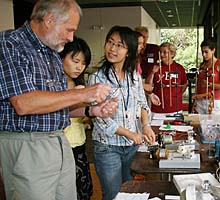The
Fun of Physics
Some 150 students, mostly new to campus, headed for McConnell
Hall on September 1 to lie across a bed of nails, spin on
a rotating stool, examine a model of the human eye, play
with laser beams and analyze the properties of sound waves.
It was all part of the first Physics Fest, a possibly annual
event hosted by the Smith physics department that aimed to
demonstrate how much fun the subject can be while imparting
its practical concepts.
“We have a personal interest in getting the word about
physics out,” says Nalini Easwar, professor of physics,
who helped coordinate the event with her department colleagues. “Students
come and experience the fun of physics, then they might say, ‘Let’s
try it.’”
All the attractions at the Physics Fest were devices used
in department courses, says Easwar. For example, the bed
of nails demonstrated what happens when weight is distributed
evenly over multiple points of contact. The spinning stool
showed participants what a figure skater might experience
when she pulls off a double axle. And when some students
sunk into a tub of Oobleck, a messy substance that changes
flow properties depending on the amount of pressure applied
to it, they learned how materials can adapt to external forces.
 The Physics Fest follows the format of a reception that
the physics department hosts during commencement week. Department
faculty members wanted to extend that event to incoming students
as well, Easwar said. The Physics Fest follows the format of a reception that
the physics department hosts during commencement week. Department
faculty members wanted to extend that event to incoming students
as well, Easwar said.
Part of the objective of the Physics Fest was to show students
that physics is not necessarily the intimidating subject
that students sometimes think it is. Though the study of
physics requires a grasp of mathematical concepts, its principles
are simply ways to explain the physical phenomena of our
environment.
“Physics is everywhere,” Easwar says. “Physics
is about understanding the world around us. It’s important
for students to realize that physics is fun and that it’s
applicable.”
With an undergraduate degree in physics, Easwar points out,
students can launch into a variety of different fields like
engineering, medical research and materials science.
“Physics teaches you methods
of problem-solving and clear analytical thinking,” she
says, “how to
organize data and conduct research, and how to work things
out”—that, and of course, how to successfully
lie across a bed of sharp nails. |























